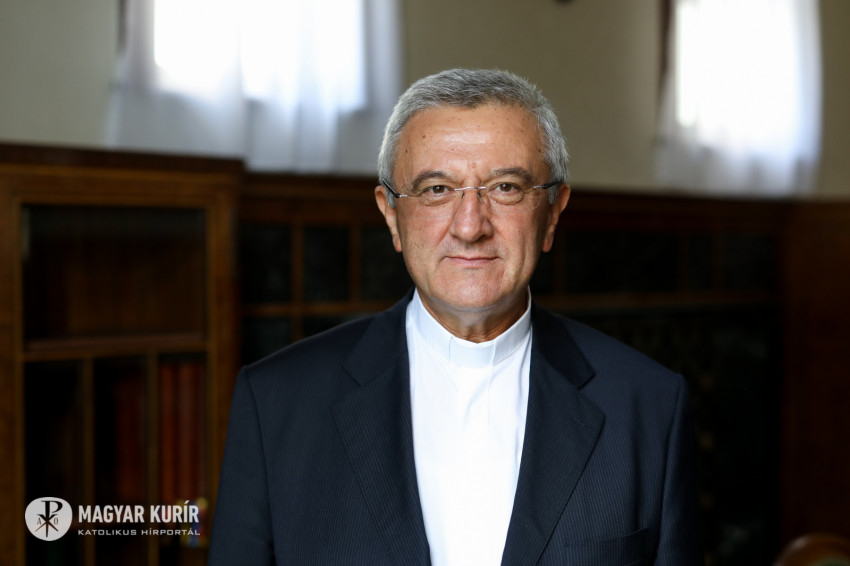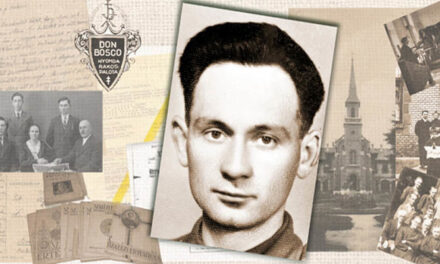Magyar Hírlap conducted a longer interview with Bishop András Veres on the occasion of the upcoming International Eucharistic Congress. The county bishop of Győr gave his opinion not only about the event, but also about the burning questions of our day. We quote some details from this article.
- We can say without exaggeration that passing on the faith is the biggest task in Hungary and probably in Europe, but also in the world. After long decades of atheisticism in our country, today we are greeted by a secularized world, which is also driving young people towards apostasy. Thank God, there were families that took care of passing on the faith even in the most difficult decades, but at the same time, after communism, the church can once again operate educational institutions where the values can be passed on. This is necessary, since the child spends most of his time outside the family at school. I dare to mention in a low voice that the interest in church schools is increasing, this, in addition to the good standard, is probably due to the fact that the values prevailing in education are attractive even to non-religious parents.
– How do you see it: passing on the faith is also the main challenge in the world church?
– Yes, but there is also the challenge of living together with non-Christian religions. In the developed world, it is also necessary to protect the value of the family, since without it both the individual and the society lose their identity. In my opinion , Hungary is currently on the right track in this field, because it is not only necessary to provide financial support to families, but also to strengthen the family as a fundamental human community....
...– How do you see religiosity in Hungary now?
- Perhaps its greatest strength lies in the fact that there are many more Hungarians who believe in God than those who practice religion. Although I know, this is both a strength and a weakness: obviously, this is also a weakness of our priestly operation, if we cannot invite the faithful to our church and community celebrations.... let's look for the reasons. Perhaps it stems from the modern mentality that, even in communism, religious people were considered stupid and uneducated, and this has not worn off to this day, even though the communist ideology has disappeared. However, several thinkers and scientists arrived at the knowledge and love of God precisely when they started looking for answers to their questions. Maybe we priests should offer more opportunities to awaken faith. The path from unbelief to deep love of God can only be traveled individually, perhaps we should give more help in this...
…The society we live in is not helping. It doesn't really help with that. The love of God shown in religiosity and the religiosity achieved through intellectual questioning are not mutually exclusive, in fact, one presupposes the other. It is quite certain that a person will not be religious without a personal relationship with God, which is why the love of God is more important. But I also believe that reason is also necessary. Among the secular witnesses of a religious community, the searching soul can find community and home. I am not sure that our religious communities today are always suitable for this….
...Nowadays, people do not see each other as partners - at best as rivals - and many people unabashedly run over others for their own interests or goals. We are in the image of God: we draw closer to God by drawing closer to other people, we must be aware of this every day. I would very much expect from the congress that, at least, the love for God and man would rise to the level of the people of faith and become actions, because only in the civilization of love can we prosper here, even in earthly life. This builds God's eternal kingdom.
– Can homosexuals fit into the civilization of love?
– I can answer your question with the wording of St. Augustine, who said to love the sinner, but hate the sin. Just because someone thinks and feels differently doesn't mean I don't accept them. It would be nice if he would accept me too, if I think and feel differently... For me, as a Christian, it has never been a problem for me to accept, respect, give, sir, even love a person with a different view, but this does not mean that the I have to accept his bad deed too. The church does not reject them either, it rejects those actions that contradict the law of nature.
- Can this distinction be maintained if the public discourse in this area is thematized by the fact that political parties use church teaching as an argument for or against?
- On the subject of homosexuality, Christianity's position has remained unchanged for two thousand years , but otherwise, pre-Christian Judaism had the same teaching. It is not a right or leftist opinion, but a position based on natural moral laws. The church is moving steadily along this path, despite all kinds of provocations. Political trends may come closer or further away from this set of values - this is their right, we can't do anything about it, we can only raise our voices when they try to politicize religion...
...Religion, Christianity is not a function of political affiliation. Although there is no doubt that every political party must consider whether it can count on Christians if it accepts or rejects certain religious values. Catholic people who are strong in their faith, on the other hand, will never represent values based on party sympathy: for them, the Christian value system is stability and the basis. The church does not bend here or there, its values do not require political confirmation or rehabilitation, it does not need explanations.
"You don't need to be defensive either?"
- You are probably aware that the media almost always contact us only when there is a conflict of values, a crime or weakness affecting us. You obviously have to wear this, because we brought it on ourselves. But other times they don't care about our opinion.
"Do you miss the debate?"
"Dispute is out of the question." When, a few years ago, they picked up a sentence of mine on the topic of birth control and created an entire discrediting campaign against me in the middle of the cucumber season, it was not done for the sake of the debate or the formation of an objective value judgment either. It was a simple attack, motivated against the Church. You can have a dialogue, you can get involved in arguments, but these are mere attacks. We have to stop, this kind of thing does not divert us from the Christian path.
– Speaking of fetal protection: the Child Protection Act is a similarly hot topic right now. Do you agree that the sexual education of children is a privilege within the family?
"Exclusively." Dear topic, because I have dealt with families since I was a novice priest, they are the ones who can say what I have been saying for decades: there would be no place for any kind of sexual education in school, because not all children mature in the same way. It is not possible to institutionalize sexual education, the child can very easily develop complexes because of this.
"What advice do you have for parents?"
– Above all, that if the child asks, they should always answer, and always in the most honest way. And make sure they say as much as the child asked. If it's not enough, he keeps asking anyway, asking again. Be partners, keep the trust...
The full interview can be read here.
(Cover photo: Magyar Kurir/Zita Merényi)












